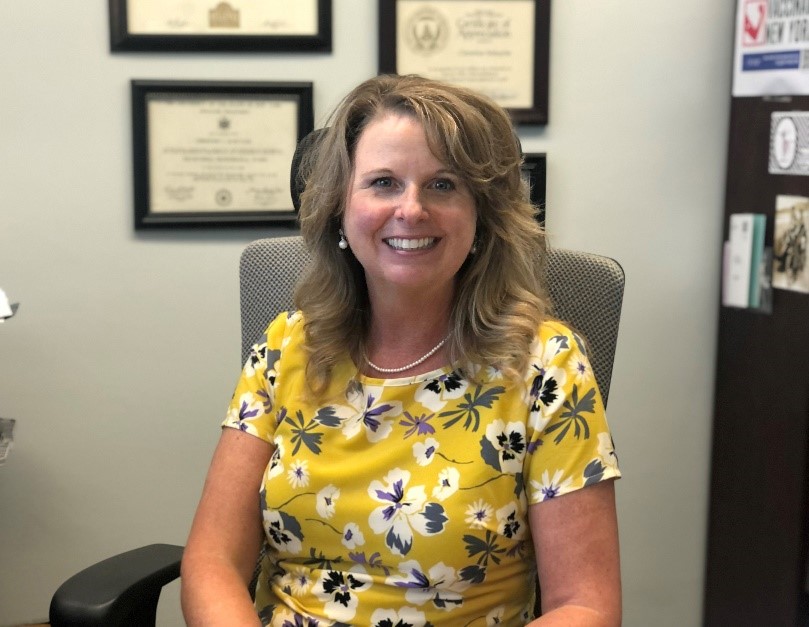Schuyler: ‘A Scary Time To Be Sick’ As COVID Cases Surge

Christine Schuyler
The number of people with COVID-19 in Chautauqua County hospitals has surged in the past week, and those inflicted with the virus seeking medical care are likely higher than what’s known and will continue to rise during the holidays.
“I don’t think the public is realizing what’s going on in our hospitals,” said Christine Schuyler, the county’s public health director, after 50 hospitalizations were reported last week, the most since January. However, Schuyler said because some residents who have tested positive for COVID may be seeking care at facilities in Buffalo, Erie or Warren, Pa., the local rate may not accurately represent the current situation.
The county recorded 663 new confirmed cases of the virus from Nov. 14 through Nov. 20. Schuyler said the virus currently appears to be inflicting younger and healthier individuals — the majority of whom are not vaccinated and are coming down with more serious symptoms requiring treatment.
As of Aug. 1, there have been 5,454 confirmed cases of the virus in the county. Of those, 56% have involved people not vaccinated against the virus, 15% who were fully vaccinated, 7% who were partially vaccinated and 22% whose vaccination status was not known.
The latest surge in cases is having an impact on local hospitals, Schuyler said.
“It’s a scary time to be sick — a scary time to have a heart attack requiring immediately help,” she said, alluding to hospitals being at near or full capacity compounded with staffing issues and the flu season.
The public health director recommends those needing care but not facing an emergency to contact their primary care physician.
Meanwhile, COVID-19 hospitalizations in Western New York are the highest in the state, excluding New York City. According to state numbers from Saturday, 478 are hospitalized in this region with 485 in New York City.
Late Friday afternoon, Gov. Kathy Hochul announced action to boost hospital capacity and address staffing shortages ahead of potential spikes in COVID-19 cases this upcoming winter. Through an executive order signed by Hochul, the Department of Health will be allowed to limit non-essential, non-urgent procedures for in-hospitals or systems with limited capacity to protect access to critical health care services.
The county’s largest hospital, UPMC Chautauqua in Jamestown, has seen a “steady increase in COVID patients” over the past several weeks, said hospital spokeswoman Karen Beardsley.
“Our activity mirrors what is being seen throughout the Western New York region,” she said. “Given this rise in cases we urge people to continue to get vaccinated, mask, and use appropriate social distancing practices.”
Schuyler again stressed the need for people to get vaccinated against COVID-19. According to the Centers for Disease Control and Prevention, 68.1% of the county’s population over the age of 12 have received at least one dose as of Nov. 21 while 62% have been fully vaccinated.
“I’m very worried,” she said. “This is a nasty virus and a very, very smart virus. It will continue to plague those who are not vaccinated unless enough of the population is vaccinated for herd immunity, and we are just not there.”
As a result, “now we’re seeing this virus attacking otherwise healthy and younger people,” she said.
Her recommendations with Christmas approaching and more gatherings planned indoors: get vaccinated if not already inoculated; wash hands regularly; practice social distancing; and wear a face mask, especially in crowded indoor areas.
“I think we need to use common sense,” Schuyler said. “We have a vaccine and people still refuse to take it, I can’t figure it out.”
OMICRON VARIANT
The World Health Organization said it could still take some time to get a full picture of the threat posed by omicron, a new variant of the coronavirus as scientists worldwide scramble to assess its multiple mutations.
According to the Associated Press, there may be an increased risk of reinfection with omicron — in other words, that people who’ve already had COVID-19 could get reinfected more easily.
Some experts say that could mean that vaccine makers may have to adapt their products at some point.
Sharon Peacock, who has led genetic sequencing of COVID-19 in Britain at the University of Cambridge, said the data so far suggest the new variant has mutations “consistent with enhanced transmissibility,” but said that “the significance of many of the mutations is still not known.”
Lawrence Young, a virologist at the University of Warwick, described omicron as “the most heavily mutated version of the virus we have seen,” including potentially worrying changes never before seen all in the same virus.
The Associated Press contributed to this story.





